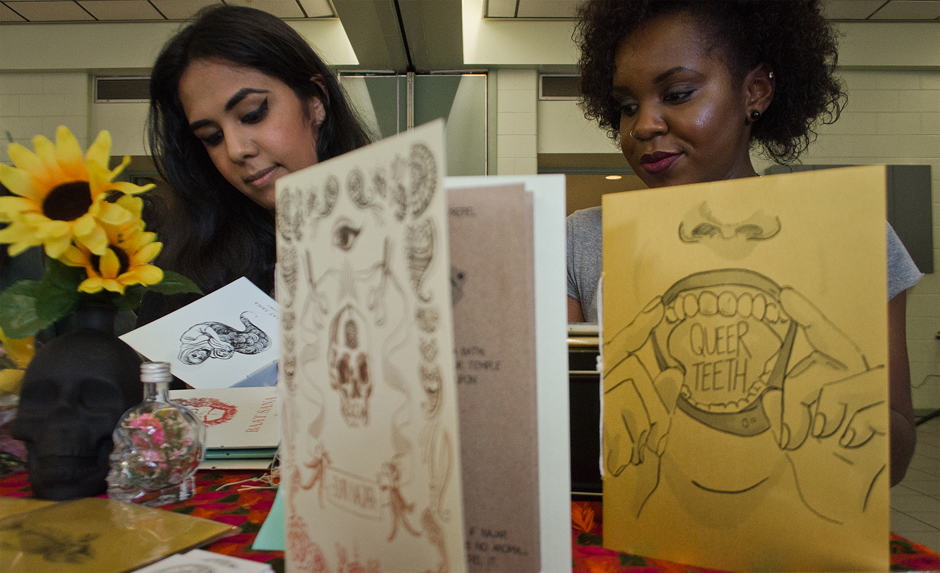Environmental activist Trish Mills has been arrested twice for her opposition against the Enbridge Line 9 Pipeline. Part of the pipeline will pass through Toronto, and will carry chemically-laden bitumen to the east coast for export. There is a high risk of an oil spill, Mills says, an event that would disproportionately affect low-income communities.
“From the Frontline: Dispatches from the Line 9 Blockade,” where Mills was a panelist and discussed these issues, was part of DisOrientation, a week-long series of panel discussions and events. DisOrientation is hosted by the Ontario Public Interest Research Group (OPIRG), an environmental and social justice organization at the University of Toronto, and the University of Toronto Students’ Union (UTSU). OPIRG seeks to foster safe spaces where concerned citizens can safely contest mainstream ideologies.
Setting the tone for these panels was the theme “Defiant Spaces,” which encouraged industry professionals and political activists to share their skills and knowledge on controversial issues like sex positivity, apartheid, and decolonization. According to Housam*, a third-year political science and equity studies student who attended DisOrientation, while confronting traditional power dynamics was a vital component of these events, OPIRG and their allies are not solely interested in defiance, but also in figuring out “how people who are marginalized use their voices, and in what kind of space.”
Challenging capitalist privilege was a key component of DisOrientation. This was evident in the opening acknowledgment at several panel discussions that the event was taking place in Toronto, the unceded territory of the Mississauga and New Credit First Nations people. Corporate interests have a particularly damaging effect on Indigenous and other marginalized populations, said panellist Danielle Boissoneau. Boissoneau spoke of her “ceremonial responsibility as an Anishinaabe woman,” and of her fight against “colonial capitalism.”
The week also included panels on building radical student democracy, the impact of austerity on disabled people, and a screening of The Internet’s Own Boy followed by a Q&A with director Brian Knappenberger.
Yogi Acharya, OPIRG-Toronto programming and volunteer coordinator, said, “OPIRG serves as the bridge between campus and community,” adding: “It is vital to provide students space to engage with these issues and ideas on campus and in our city.”
While DisOrientation is marketed to first-year students as an alternative orientation week, professors, alumni, and community members also attended the events. Many participated in the open floor question period at the end of the talks, citing their concerns and sparking debate.
Helen Lenskyj, professor emerita and sports sociologist, was a keynote speaker at the “Game On: Building Pan Am Resistance” panel. Lenskyj spoke of the “magic of sport,” or sport’s ability to act as a smokescreen to far-reaching violations of human rights perpetrated by multi-national sporting corporations. Lenskyj also spoke about the university’s complicity in the Pan Am and Parapan American Games, which are set to place in Toronto in 2015.
The Toronto Pan Am Sports Centre, which will be home to visiting athletes competing in pentathlon, aquatics, and fencing divisions, recently commenced operation at the university’s Scarborough campus. These types of facilities require funding, and in the case of the Scarborough Sports Centre, said Lenskyj, students are paying the price.
Before and after the Games, the centre will be the home of the Scarborough campus’s Department of Athletics and Recreation, and will be open to UTSC students, faculty and staff.
In 2010, students passed a levy on whether future UTSC students should pay for the centre, in addition to having an increased fee starting in September 2014 devoted to the Centre. Last September, incidental fees were increased by $95.01 per semester for full-time students. Students will pay the increased fees for the next 25 years.
Lenskyj expressed her disagreement with the fee increase, saying that students not yet born will be paying for a facility that will no longer be state of the art.
Anti-poverty activist Kelly Sue Burgess spoke of alternative uses for the money. Burgess explained that homeless centres in Toronto are overflowing, with an estimated 92,000 people on waiting lists for affordable housing. There are also fears that a process of displacement will occur in preparation for the Pan Am games, similar to the displacement caused by the 2014 World Cup in Brazil.
According to Al Jazeera, 250,000 people from low-income neighbourhoods were forcibly removed from their homes to make room for the World Cup.
Both the “From the Frontline” panel and the “Game On” panel represented the essence of OPIRG’s definition of a defiant space. According to Brad Evoy, a student activist and blogger who formerly served as external commissioner at the Graduate Students’ Union (GSU), DisOrientation served as an introduction for many students to “broader areas of community organizing and environmental justice, and how these areas intersect actively with campus.”
Evoy added that DisOrientation was an opportunity to re-orient students away from “a campus framed in ideological and social contradictions.”
*First name used at student’s request.


